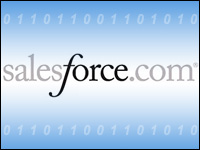
Salesforce.com officially unveiled its new software for the wealth management industry, confirming rumors that it won a 25,000-seat contract withMerrill Lynch to deploy the application.
By itself, the Merrill Lynch deal is a noteworthy event. Increasingly, large firms are incorporating Software as a Service in their operations; however, typical deployments have hovered in the 5,000- to 10,000-seat range. Occasionally, such as in the case with Dell’s and Cisco’s deployments of Salesforce, those numbers have reached 15,000 subscribers.
Leveraging Apex
Nevertheless, Salesforce.com’s introduction of the new Wealth Management Edition is the company’s most significant announcement in some time. Until now, the firm has concentrated its innovation efforts on its flagship product and, in more recent years, its development platform. This is the first major industry-specific application Salesforce.com has introduced.
“Salesforce Wealth Management Edition changes the game for financial institutions,” said Marc Benioff, chairman and CEO, Salesforce.com. “Merrill Lynch is the showcase example of this new circle of success: on-demand applications, platform innovation and leading industry partners via the AppExchange. In fact, more than 1,200 financial services companies are already using Salesforce as the on-demand standard to manage their business.”
Given Salesforce’s market heft and the fact that the Wealth Management Edition is built on its Apex platform and AppExchange directory, the rollout has bigger implications than a typical vertical release. *correction
New Competitors
For starters,Salesforce is competing with all of the financial service industryCRM applications on the market — a significant group, considering this is the largest industry to adopt vertical CRM tools in a big way.
Salesforce is also taking aim atBloomberg, which provides a robust desktop application for financial traders. Indeed, analogies to Salesforce’s very public push against Siebel in the early part of the decade are already being drawn.
It’s not that Salesforce’s financial services tool is capable of stealing away a huge chunk of Bloomberg’s market share, Martin Schneider, an analyst with the 451 Group, told CRM Buyer. “The heavy traders that rely on Bloomberg’s entire portfolio and real-time data — they will never switch. But the smaller traders that manage portfolios for a handful of clients — they are a prime target.”
Then there is the addition of CRM and contact management tools that these smaller traders do not get with Bloomberg. “That fits in perfectly with their business model — they want to monitor those stocks that could have an impact on their clients’ portfolios and then contact them about possible changes,” Schneider added.
Client Share
Given the high per-seat price it charges, Bloomberg is not likely to relish losing any client share.
“It remains to be seen how quickly, if at all, they will react to the challenge,” Denis Pombriant, principal with Beagle Research Group, told CRM Buyer. Siebel didn’t take Salesforce seriously at first, he noted.
The Salesforce versus Siebel fight has been somewhat mischaracterized, 451 Group’s Schneider added. “It was never the one-to-one fight that has been portrayed. Siebel was battling a number of market forces and other enterprise vendors. Salesforce.com was putting pressure on it at the low end,” he said.
The same mix of players and market dynamics is likely to brew as Salesforce tries to carve out market share in the wealth management space, Schneider added.
New Features
Salesforce.com’s Wealth Management Edition includes the following:
- Client 360, which profiles clients and prospects, recognizes the next interaction and last interaction, and integrates all related information about the client;
- Know Your Client, a feature that will help financial advisors record regulation-mandated data in client records. It will also provide workflow and approval management to assign specific related tasks to team members, establish required reviews, and manage approvals.
- Client Team Calendaring, a productivity enhancement that also streamlines the process of scheduling the internal advisor team with the client, as well as the client’s spouse, attorney or accountant.
- Client Action Plans, which allow users to define templates for creating and assigning specific sets of tasks based on certain events; and
- Household Management, which profiles household budgets and related data.
*Editor’s note: The original published version of this article referred to Salesforce.com’s “open source Apex platform.” However, the platform is not open source. We regret the error.





















































